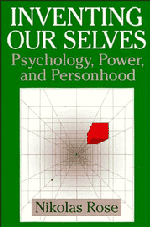Inventing our Selves
Inventing Our Selves proposes a radical new approach to the analysis of our current regime of the self, and the values of autonomy, identity, individuality, liberty and choice that animate it. It argues that psychology, psychiatry, psychotherapy and other "psy" disciplines have played a key role in "inventing our selves," changing the ways in which human beings understand and act upon themselves, and how they are acted upon by politicians, managers, doctors, therapists and a multitude of other authorities. These mutations are intrinsically linked to recent changes in ways of understanding and exercising political power, which have stressed the values of autonomy, personal responsibility and choice. The aim of this critical history is to diagnose and destabilize our contemporary "condition" of the self, to help us think differently about the kind of persons we are, or might become.
- New approach to the social construction of subjectivity
- New way of linking history of psychology to politics and power
- Original development of theoretical perspectives of Michel Foucalt and Gilles Deleuze
Reviews & endorsements
"...Nikolas Rose's work continues to be one of the most exciting efforts to bring Foucalt's work to bear on sociological research and to produce an account of power in advanced liberal societies." Jonathan Simon, Contemporary Sociology
"nventing Our Selves is one of the most valuable studies of the techniques of gevernment and self-government available in the English language." Angel J. Gordo-López, Journal of the History of the Behavioral Sciences
Product details
December 1998Paperback
9780521646079
236 pages
229 × 154 × 23 mm
0.335kg
Available
Table of Contents
- 1. Introduction
- 2. How should one do the history of 'the self'?
- 3. A critical history of psychology
- 4. Psychology as a 'social' science
- 5. Expertise and the 'techne' of psychology
- 6. Psychology as an 'individualizing' technology
- 7. Social psychology as a science of democracy
- 8. Governing enterprising individuals
- 9. Assembling ourselves
- 10. Notes
- 11. Bibliography.







